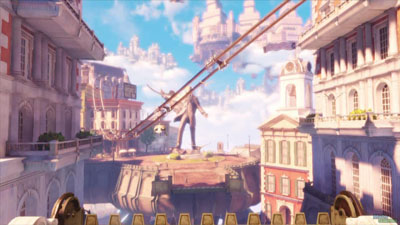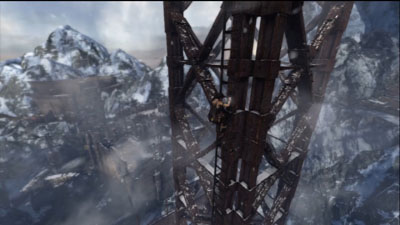Bioshock Infinite

Bioshock Infinite has a complex and interesting narrative that it presents exceedingly well. Picking up on the big themes is easy enough and there are layers and layers of exposition to dig through – obvious ones like the diaries left all over the world to small details in the environment lend a sense of reality to a world that is meant to be fantastical and feel slightly off for thematic reasons rather than technical. The story has great pacing and builds up naturally towards a reveal and a twist that was surprising but made sense; in terms of story very few games even come near the complexity and detailwork of it – honestly, that alone should be enough to play it.
The game attached to it all is… Okay. Good, at times – it is very rarely frustrating, features a solid first-person shooter at its core and some additions to mix up the action, not unlike the original Bioshock. It does not feel very thought-out or innovative though, like the game was attached to the story as an afterthought. Killing enemies from ziplines is cool and all, but there is very little depth in it so after a couple of minutes you’ve got the hang of it. There is an abundance of upgrades of different kinds, there may be some interesting subtleties for the higher difficulty levels here but lower down on the chain customization was more about the quantity of choices than making the individual ones feel like they mattered. Again, it is a solid game with some neat ideas, but most of them don’t really go beyond neat ideas.
Another thing that makes the game feels tacked-on at times is the clash between the narrative and player agency. Bioshock was presented as a series of closed chambers so it worked better there, but Bioshock Infinite takes place in the vast expanse of the skies and is still a rather linear sequence of closed chambers. On the flipside, the gameplay sometime hurts the narrative as well – it becomes hard to be horrified by a scene where an execution took place only minutes past if you immediately get a cash bonus for looting the bodies.
… Considering the average review score it seems that reviewers like being told a good story in an interesting setting while being engaged in familiar gameplay. That part is interesting in itself – I can think of several games that are lacking in story but have far bolder (and better) gameplay that has fared much worse in the eyes of the media. Then again, I would guess that the accessibility of the story plays just as big a role in movie reviews, and for both mediums you can find critics who have differing sets of criteria. Also, Bioshock Infinite is well worth the attention and time.
Tomb Raider

Tomb Raider wants to be a mix of Uncharted and Arkham Asylum. The vistas, climbing and action sequences are there but there is also an upgrade system with hidden bonuses and unlockable skills – when you take the time to explore. The game is superficially even more linear than Uncharted though, when you are not playing through a quicktime event or guided sequence it tells you to hurry up and get to the next objective – it never encourages the player to explore and see the complex part of itself. This doesn’t really matter if you do decide to pick it apart but if you don’t the gameplay elements feel rather disjoint. Tomb Raider also doesn’t reward the player for backtracking as you can pick up everything on the path you are required to play the game. The exploration elements as such are not bad, they just tend to revert to cheap ways of hiding things that you have little purpose to look for and the skills involved feel very game-y. It feels tangential to the real game which is sad since they really give it character.
The benefit of rushing the player through the game is that the story feels more coherent, and I liked that part a whole lot more than either Arkham Asylum or Uncharted. I did not have very high hopes for it originally since I did not care for Rhianna Pratchett’s work on Heavenly Sword or Mirror’s edge, and there was the whole controversy bit a while back that made it sound like a cheap horror story. Tomb Raider delivers a real character arc that is not overplayed and is tightly connected to the actual growth of Lara in terms of game mechanics, and the exploration parts of the game are tied into the supporting cast and backstory of the world in an interesting way. The supernatural parts could have been handled better, but at least they are heavily downplayed.
Tomb Raider doesn’t do a lot of new things that feel really fresh design-wise, but it executes what it does mostly well and presents a story that is both better crafted and more interesting than similar games.